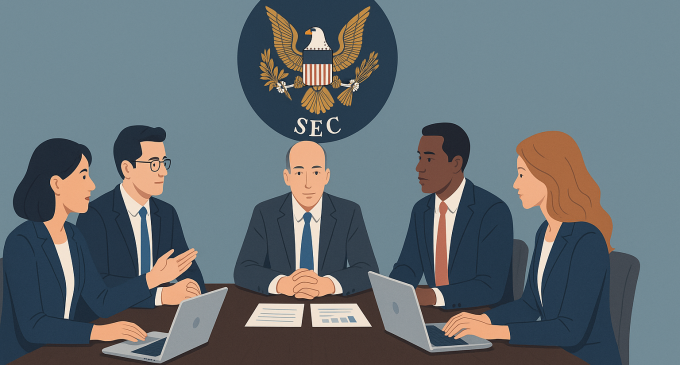
Introduction
Cryptocurrency markets have seen explosive growth over the past decade, prompting regulatory bodies worldwide to reevaluate their stance on digital assets. In the United States, the Securities and Exchange Commission (SEC) has played a crucial role in overseeing the crypto industry, ensuring compliance with federal securities laws. However, the lack of clear guidelines has led to significant challenges for both regulators and industry participants.
To address these concerns, the SEC recently initiated a series of discussions with key figures in the cryptocurrency space. These discussions aim to refine existing regulations, create clearer compliance guidelines, and foster innovation while ensuring investor protection. This article explores the key points of these discussions, potential regulatory changes, and their implications for the future of the crypto market.
The SEC’s Role In Crypto Regulation
The SEC is the primary regulatory authority overseeing securities laws in the U.S. While traditional financial markets operate under well-defined regulations, the cryptocurrency industry presents unique challenges due to its decentralized nature.
Why is the SEC Involved in Crypto Regulation?
Investor Protection: Cryptocurrencies, being largely unregulated, have been prone to scams, fraudulent Initial Coin Offerings (ICOs), and market manipulations. The SEC aims to minimize these risks by implementing stricter rules.
Market Stability: Regulatory clarity can help stabilize the crypto market, reducing volatility and increasing investor confidence.
Preventing Illicit Activities: Digital assets have been used for illicit activities such as money laundering and fraud. A comprehensive regulatory framework can help mitigate these risks.
Encouraging Innovation: While regulation is necessary, it should not stifle innovation. The SEC seeks to balance regulatory oversight with industry growth.
Challenges Faced by the SEC
Despite its efforts, the SEC has faced difficulties in implementing effective crypto regulations. These challenges include:
Defining Cryptocurrencies: Are they securities, commodities, or a new asset class? This question remains a significant point of debate.
Decentralization Issues: Unlike traditional financial entities, cryptocurrencies operate on decentralized networks, making enforcement challenging.
Lack of Legislative Clarity: Congress has yet to pass comprehensive crypto legislation, leaving the SEC in a gray area regarding its authority over digital assets.
SEC’s Recent Discussions With Crypto Industry Leaders
In an attempt to address these challenges, the SEC has engaged in conversations with key industry players, including representatives from major cryptocurrency exchanges, blockchain developers, and financial institutions. These discussions have focused on several key areas of regulatory concern.
Classifying Cryptocurrencies: Security vs. Commodity
One of the primary issues discussed was the classification of cryptocurrencies. The SEC has historically classified some tokens as securities under the Howey Test, which determines whether an asset qualifies as an investment contract. However, industry leaders argue that many cryptocurrencies function more like commodities (such as Bitcoin) rather than securities.
Proposed Solutions
- Establishing clear guidelines to differentiate securities from commodities.
- Collaborating with the Commodity Futures Trading Commission (CFTC) to create a unified regulatory framework.
- Introducing a new asset class specifically for cryptocurrencies.
Regulatory Clarity for Crypto Exchanges
Crypto exchanges, such as Coinbase and Binance, have long struggled with unclear regulations regarding their operations in the U.S. The SEC aims to create clear compliance requirements for these platforms to ensure fair market practices.
Key Discussion Points
- Standardizing Know Your Customer (KYC) and Anti-Money Laundering (AML) policies.
- Establishing licensing requirements for crypto exchanges.
- Addressing concerns over wash trading and market manipulation.
Decentralized Finance (DeFi) Regulations
The rise of Decentralized Finance (DeFi) platforms has introduced new regulatory challenges. Unlike traditional financial institutions, DeFi platforms operate without intermediaries, making it difficult to enforce compliance.
SEC’s Approach
- Exploring potential regulations tailored specifically for DeFi.
- Requiring DeFi projects to implement basic compliance measures.
- Partnering with blockchain analytics firms to monitor illicit activities.
Stablecoin Oversight
Stablecoins, digital assets pegged to fiat currencies, have come under regulatory scrutiny due to their potential impact on financial stability. The SEC is collaborating with the U.S. Treasury and the Federal Reserve to create stablecoin regulations.
Proposed Measures
- Requiring stablecoin issuers to maintain transparent reserves.
- Implementing audit requirements to ensure financial stability.
- Defining whether stablecoins should be classified as securities, commodities, or a new financial instrument.
Potential Policy Changes And Their Impact On The Crypto Industry
The SEC’s discussions with crypto industry leaders could lead to significant policy changes. These potential changes include:
Creation of a New Crypto Regulatory Framework
Rather than applying traditional securities laws to crypto, regulators may introduce a new legal framework tailored specifically to digital assets.
Increased Compliance Requirements
Crypto exchanges, DeFi platforms, and stablecoin issuers may be required to comply with stricter regulations, including enhanced KYC and AML policies.
Clarity on Taxation
The IRS has struggled to classify and tax cryptocurrencies effectively. New regulations could provide clear tax guidelines for crypto investors.
Improved Consumer Protection
New policies may introduce better security measures for investors, reducing fraud and protecting retail traders.
Industry Reactions To The SEC’s Initiative
The SEC’s efforts to engage with industry leaders have received mixed reactions.
Positive Reactions
- Many industry leaders appreciate the SEC’s willingness to collaborate rather than impose unilateral regulations.
- Clear regulations could encourage institutional investors to enter the crypto market.
Concerns from the Crypto Community
- Some fear that excessive regulation could stifle innovation and push companies to relocate offshore.
- Others worry that regulations may favor large financial institutions over smaller crypto startups.
The Future Of Crypto Regulation In The U.S.
As discussions between the SEC and industry leaders continue, the future of crypto regulation remains uncertain. However, key trends indicate a shift towards a more structured regulatory environment.
Greater Collaboration Between Regulators and Industry Leaders
The SEC’s willingness to engage with crypto companies suggests a move towards regulations that support industry growth while ensuring compliance.
Possible Legislative Action
Congress may introduce new bills specifically aimed at regulating digital assets, potentially clarifying the SEC’s authority over cryptocurrencies.
Evolution of Global Crypto Policies
The U.S. is not alone in its regulatory efforts. Other countries, such as the EU and Japan, have already implemented comprehensive crypto regulations. The U.S. may take inspiration from these frameworks.
Conclusion
The SEC’s ongoing discussions with crypto industry leaders represent a significant step toward establishing clear and effective cryptocurrency regulations. While challenges remain, the dialogue between regulators and industry participants suggests a willingness to create policies that protect investors without stifling innovation.
The coming months will be critical in shaping the future of crypto regulation in the U.S. As the SEC continues to refine its approach, industry leaders, investors, and policymakers must work together to develop a regulatory framework that balances compliance, security, and technological advancement.







There are no comments at the moment, do you want to add one?
Write a comment